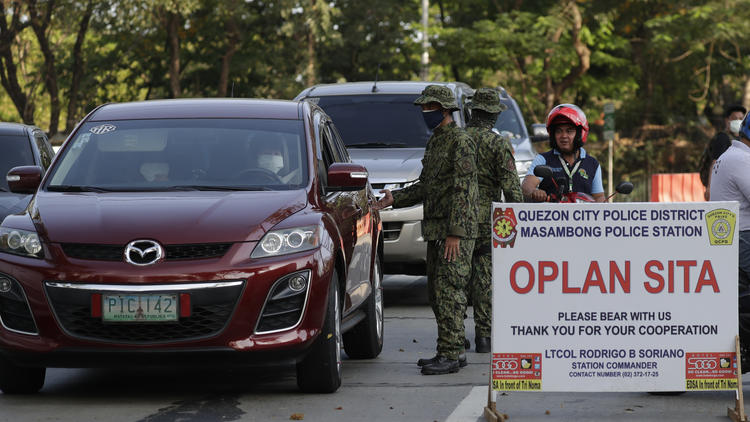In the fight against coronavirus, Asia's governments adopt emergency laws

The new corona virus is spreading in Southeast Asia. As public life stands still, governments expand their powers.
The metropolis of Manila looks like a ghost town. There is a curfew, and only the most necessary errands are still allowed. Checkpoints are installed, manned by soldiers and police officers to ensure that citizens comply with the strict regulations. The new coronavirus suddenly stopped everyday life in the Philippines. But the pandemic doesn't just change the streetscape - it also has an impact on politics.
President Rodrigo Duterte, notorious for his radical anti-drug war, has declared a state of emergency. The authoritarian politician secured “special powers,” including reallocation of public funds. Local lawyers’ associations such as the Free Legal Assistance Group (FLAG) describe the increase in power as “superfluous”. Originally, Duterte had also pushed for the right to take over private companies, but public outcry prompted Congress to tone down the bill. If the crisis persists, Duterte still has “standby power” to take over private medical facilities and public transportation.
Not only Duterte is gaining for more power because of the pandemic. For decades, many states in Southeast Asia have been shifting between democracy and authoritarianism. In many cases, mixed forms have been established. Opposition members are now worried that governments in Myanmar, Thailand, and Cambodia could take advantage of the crisis to further undermine the already weak democratic systems.
The number of cases in Southeast Asia is still relatively small, but is continuously increasing. In Vietnam, as of this writing, 188 infections have been recorded. There are more than 1,400 cases in the Philippines, and more than 1,300 in Thailand. Malaysia has the highest number in the region with more than 2,400. Compared to Europe, there are still a few infections: Europe has registered more than 330,000 infections, and fewer than 8,000 in Southeast Asia. However, a high number of unreported cases is expected.
Military taking control
Despite the low number of cases, the region is already in an alarm state. Travel between states has become almost impossible. In many of the otherwise bustling megacities, life has declined significantly. In Bangkok, the big department stores in the city center had to close, and restaurants only offer their food to take away or as delivery. Passengers of trains in Bangkok are required to wear masks. Thailand and Myanmar have also postponed local New Year celebrations - an unprecedented step. When the first cases were confirmed in Myanmar, people rushed to the supermarkets, and hoarded groceries at night.
The uncertainty of the situation could also benefit the often-influential armies in the region. In Myanmar, the armed forces are seen as opponents to the civilian government of Aung San Suu Kyi. Now the soldiers present themselves as quick-witted civil protection officers. They are converting 17 military hospitals into COVID-19 hospitals, while the civilian government is stumped, and has limited resources.
Prime Minister Prayuth Chan-ocha has also declared a state of emergency in Thailand. The general had rushed to power in 2014, and his government was only democratically legitimized in 2019 in a restricted election. Now Prayuth has many immense authority again that he also held as the junta chief.
The new status allows the government to use the military, among other things, to dissolve assembly. In addition, the government can now control the press even more - a practice that was common even before the pandemic, and is now becoming even easier.
How easily the pandemic can be politically exploited is already evident in Cambodia. Security forces arrested four members of the dissolved Cambodia National Rescue Party (CNRP); the reason: the opposition expressed publicly that the government could not contain the virus. According to Human Rights Watch, even a 14-year-old girl had to be taken into police custody. She had expressed her fear of COVID-19 on a social network.
The coronavirus is fatal. Would it also be lethal to democracy?
Frederic Spohr is the Head of FNF Thailand and FNF Myanmar.